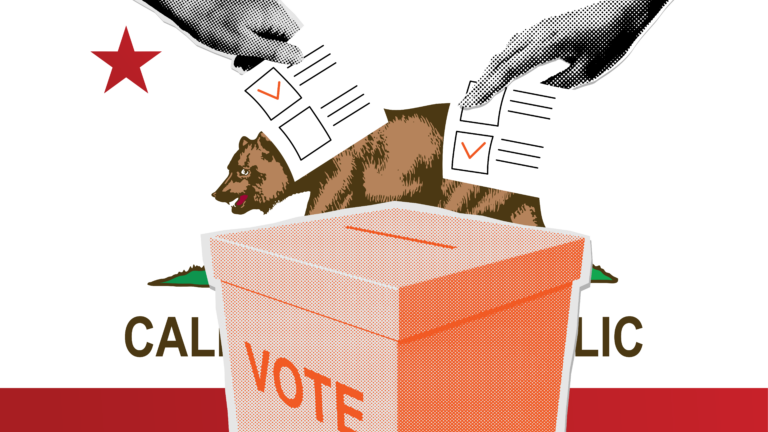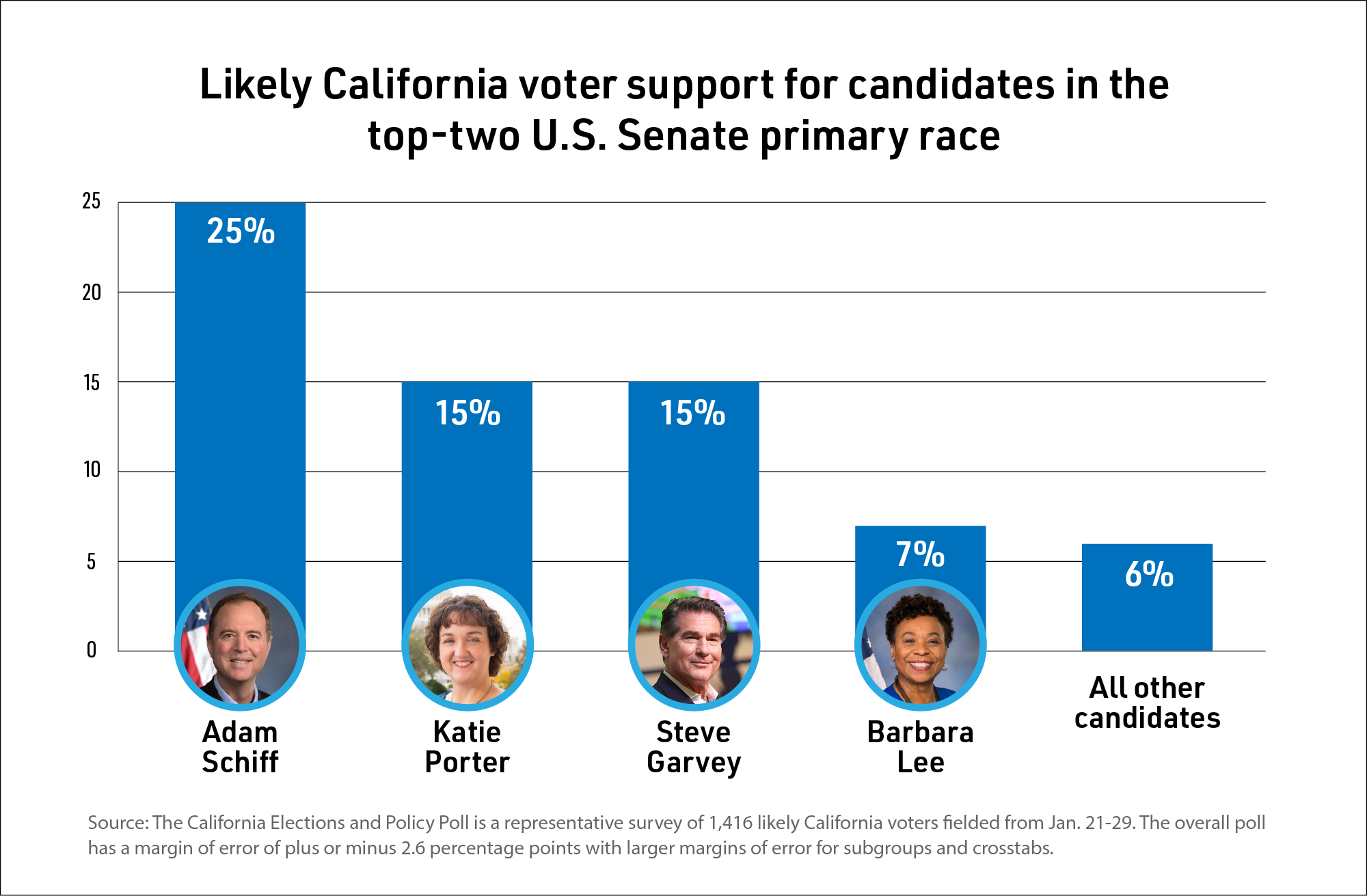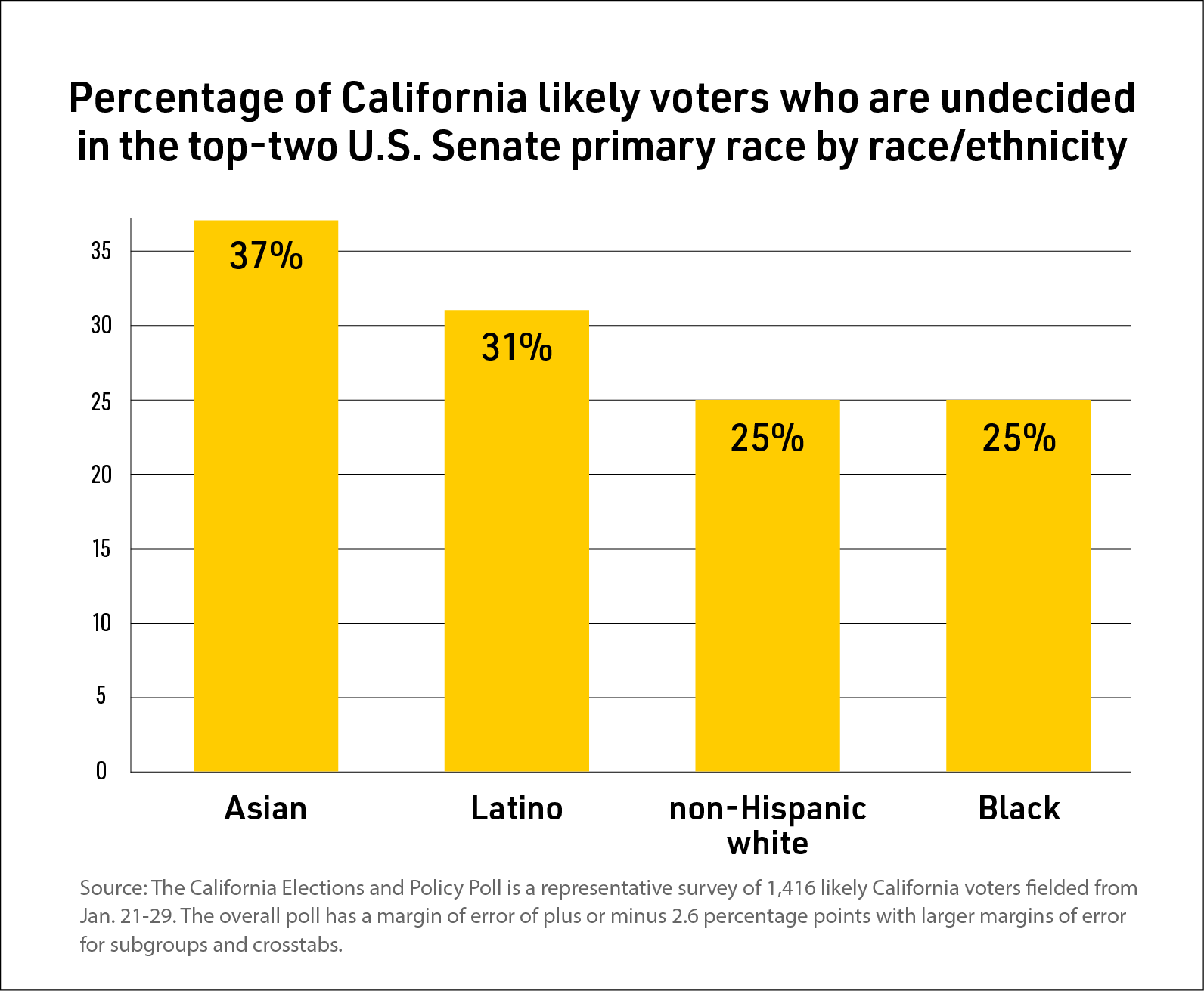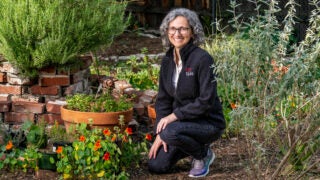
The California primary is March 5, but early voting begins soon. (Illustration/Letty Avila; Image Source/iStock)
California voter poll: Schiff leads, while Porter and Garvey neck-and-neck for second in the U.S. Senate primary
The survey by USC, CSULB and Cal Poly Pomona shows many likely voters remain undecided, and that Garvey’s history with the Dodgers isn’t boosting his chances.
U.S. Rep. Katie Porter and former Los Angeles Dodger Steve Garvey are deadlocked in the race for second place in the U.S. Senate primary in California, according to a new poll on California politics and policies from USC; California State University, Long Beach; and Cal Poly Pomona.
U.S. Rep. Adam Schiff, a Democrat, leads all candidates with 25% of likely voters, according to the California Elections and Policy Poll. Porter, a Democrat, and Garvey, a Republican, each received support from 15%. Other candidates are in single digits, with Democratic U.S. Rep. Barbara Lee in fourth place at 7%, the poll found.
California primary voters can choose any candidate, regardless of party, and the top two vote-getters in the March 5 primary advance to the general election. The representative survey of more than 1,400 likely voters shows the second and final spot on the general election ballot is still up for grabs.

With about a week until early voting begins, many voters remain undecided. The poll, sponsored by the Center for Urban Politics and Policy at CSULB in collaboration with USC researchers, found that 29% of likely voters do not yet know who they will vote for, including 42% of independents, 37% of Republicans and 19% of Democrats.
The survey also suggests that Asian American and Latino voters, the two fastest-growing racial/ethnic groups in the state, could swing the outcome.
- MORE: See additional poll results.
“This poll shows the California Senate race is a nailbiter for second place,” said Christian Grose, professor of political science and international relations and public policy at the USC Price School of Public Policy and the USC Dornsife College of Letters, Arts and Sciences. “Who places second could turn on how Asian American and Latino voters choose to cast votes, as these two groups are more undecided than non-Hispanic white voters and Black voters.”

Schiff placed first among Asian voters (27%), followed by Porter (11%), Lee (10%) and Garvey (5%). Among Latino voters, Porter placed first (19%), trailed by Garvey (16%) and Schiff (14%) — all of which were within the margin of error.
Garvey, a former first baseman and National League MVP, is not winning Dodgers fans’ votes, suggesting his strategy of emphasizing his Dodgers experience is not working. Researchers asked likely voters which California team is their favorite: Schiff led among Dodgers fans with 29%, while Garvey had 16% of the vote from Dodgers fans and Porter 15% — a statistical tie for second. That is effectively the same vote support for these three candidates among all likely voters in the state.
“The battle for first place and second place is not really decided. All candidates have room to grow if they can persuade independent voters,” Grose said. “These results show a Senate race that is in flux. California voters are just now tuning in, and many have yet to make up their minds. Schiff, followed by Porter and Garvey tied, have work to do between now and Election Day.”
Voters’ opinions on presidential candidates, state policies
In addition to the Senate race, the poll surveyed voters’ opinions on the U.S. presidential election and several current and past state ballot measures.
President Joe Biden (52%) leads former President Donald Trump (25%) by a wide margin with the numerous third-party candidates receiving about 20% of the total vote.
The poll also found that most voters blame the decade-old Proposition 47 — which raised the threshold for a theft to be considered a felony — for the rash of “smash and grab” thefts in California. Among likely voters, 52% “definitely” believe Proposition 47 caused an increase in petty thefts, while an additional 19% say the law “somewhat” caused a rise in smash and grabs.
Additional poll results include:
- Incumbent George Gascón leads a crowded field for the March primary election for Los Angeles County district attorney, but his approval ratings show potential weakness: 24% of L.A. County voters approve of the job Gascón is doing as district attorney, while more than half of likely voters (51%) disapprove.
- California voters have strong views on housing. A majority (58%) agree with the state’s decision to sue localities to build more housing. A very large majority of Californians (74%) support the “friend of court” brief filed by the California State Association of Counties to make it easier for states to remove homeless encampments in public spaces, while only 17% oppose. Gov. Gavin Newsom also has supported this position before the U.S. Supreme Court in the yet-to-be-decided Grants Pass case.
- Proposition 1, the Behavioral Health Services Program and Bond Measure that changes how existing funds are allocated for mental health and substance abuse challenges, is supported by 66% of likely voters. Newsom this week rolled out a campaign to support the ballot initiative, which is on the March 5 ballot.
- A large majority (71%) support keeping an existing law that prohibits new oil and gas wells near schools, homes or hospitals; 20% support a ballot initiative to get rid of that restriction on oil and gas well construction.
More about the California Elections and Policy Poll: The poll of 1,416 likely voters was conducted from Jan. 21 to Jan. 29 and has a margin of error of plus or minus 2.6 percentage points. The Center for Urban Politics and Policy at Cal State Long Beach sponsored the poll in collaboration with USC researchers. In addition to Grose, the poll was conducted by CSULB Assistant Professor Matthew Mendez Garcia, Cal Poly Pomona Assistant Professor Jarred Cuellar and Raquel Centeno, a doctoral student at USC Dornsife. Garcia and Cuellar earned their doctorates at USC and were students of Grose.
Voters were randomly sampled from the California voter file, ensuring representativeness of the state’s voters. Voters were screened for those who said they were “extremely likely” or “somewhat likely” to vote. To ensure representativeness of the electorate, researchers recruited an oversample of Asian American, Black and Latino voters. Survey weights that are standard in the field were used to adjust the full sample, including these oversamples, to be representative of the California electorate. The survey was fielded in both English and Spanish.



